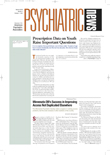I would like to comment on the article in the September 20, 2002, issue headed “APA Developing Recommendations to Improve Patient Safety.” The article addressed safety regarding psychiatric units.
Duration of stay anywhere in a general hospital has significantly decreased to just a very few days. So much must happen within this time. Frequently, no one acts to orchestrate collaboration for each patient on every medical or surgical unit to help maintain the psychosocial aspect of safety for every patient.
It is my belief from public health, preventative health, community mental health, and systems perspectives that psychiatric departments and/or departments of behavioral health associated with general acute care facilities should feel partly responsible to help prevent psychosocial sentinel events throughout the general hospital. This might entail the interaction of administrative direction, hiring practices, cooperation between registered nurses, and assistant personnel, as well as involvement of families, staff physicians, and the community at large.
Some specific topics that might be addressed through continuing dialog with administrations and/or participation in in-service training are the following:
• Hospitals might provide an informed consent to patients regarding the recruitment of competent family members, friends, or privately hired personnel as a possible valuable adjunct in the patient’s room to help facilitate the safety net. Hospital staff would need training in how to include this type of assistance. Perhaps creating specific volunteer programs to assist when no one else is available would be useful. Why should informed consent be required only by professionals about to do special procedures within hospitals?
• Hire licensed practical nurses (LPNs) and unlicensed assistive personnel (UAPs) according to “acuity” of care needed and not according to the number of patients on a unit.
• Hiring for “acuity” might cost approximately $28,000 (plus benefits) for each such additional personnel instead of the national average of $42,000, or $64,000 for specialty trained registered nurses.
• Patients and hospitals might benefit if decisions regarding “acuity” were a joint decision between physicians and nursing departments.
• Registered nurses could more frequently support LPNs and UAPs in their efforts to advocate better safety for their patients.
• LPNs and UPNs should not be rotated or “floated” to other units so that patients have continuity of care.
• More outreach by hospitals sharing their challenges with the community and requesting community oversight in addition to input from their hospital boards might well facilitate improved patient safety. This could include joint hospital, physician, and community participation in nursing personnel exit interviews.
I believe that the suggestions I have made do not conflict with the JCAHO’s notion of voluntary omission of error and the simultaneous confidentiality that is conferred. I envision a slow process, constructive and not punitive, as hospital and community evolve together.
With the above in mind, I am hoping that hospitals throughout the United States adopt the Institute of Medicine’s “patient-centered” recommendations.
